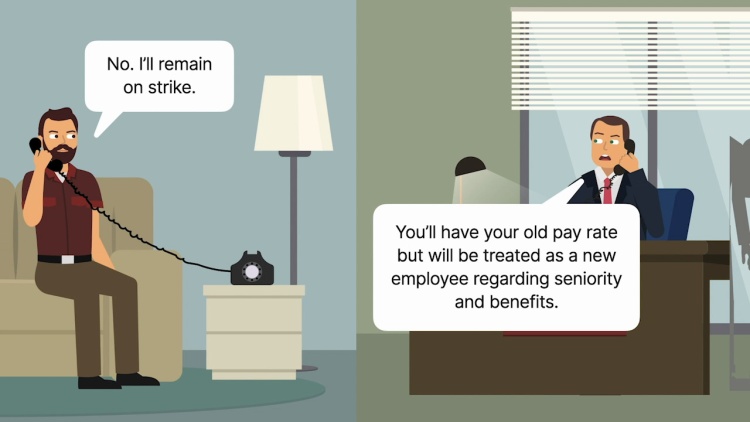Laidlaw Corp.
National Labor Relations Board
171 N.L.R.B. 1366 (1968)
- Written by Rose VanHofwegen, JD
Facts
A union planned to strike at Laidlaw Corp. (defendant) beginning on January 12. The day beforehand, the plant manager had announced that any strikers replaced would forever lose their right to Laidlaw employment. Worker William Massey initially joined the strike but requested reinstatement on January 14. Laidlaw had filled Massey’s position and said it would only rehire him on new-hire terms. On January 18, the company offered Massey an opening, but Massey refused new-hire terms. Most strikers applied to return on February 11. The company reinstated some to fill open vacancies but had already hired replacements for the rest and began terminating them. But the company continued advertising for open permanent positions and hired several new employees. Strikers protested the terminations and renewed the strike. Meanwhile, the union filed unfair-labor-practice charges with the National Labor Relations Board (NLRB) (plaintiff). The trial examiner found that the strikers remained employees entitled to reinstatement when positions became open, meaning Laidlaw discriminated against them by hiring new employees instead. Therefore, the examiner recommended that the NLRB order reinstatement.
Rule of Law
Issue
Holding and Reasoning ()
What to do next…
Here's why 907,000 law students have relied on our case briefs:
- Written by law professors and practitioners, not other law students. 47,100 briefs, keyed to 996 casebooks. Top-notch customer support.
- The right amount of information, includes the facts, issues, rule of law, holding and reasoning, and any concurrences and dissents.
- Access in your classes, works on your mobile and tablet. Massive library of related video lessons and high quality multiple-choice questions.
- Easy to use, uniform format for every case brief. Written in plain English, not in legalese. Our briefs summarize and simplify; they don’t just repeat the court’s language.





